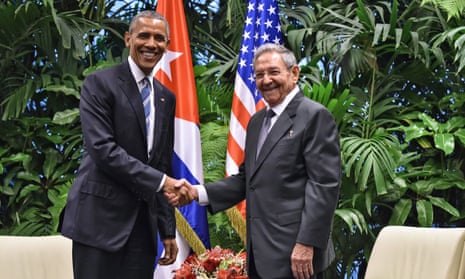Your front-page report on Obama’s visit to Cuba (22 March) ends with the claim that Cuba has “challenges” in the area of democratic and human rights, noting that “police arrested dozens of pro-democracy protesters”. Dozens, and we are not sure if these were peaceful protesters or not. How much more of a challenge do our supposedly democratic countries have, then, when they routinely kettle and arrest hundreds of peaceful protesters?
I still remember the shameful caging in inhuman conditions of more than 1,000 protesters arrested at the Toronto G8/G20 meetings in 2010. The city had been put into lockdown to try and prevent protest, and a massive warehouse was hired and equipped in advance with stacked cages to hold arrested protesters. Police and military outnumbered the protesters by two to one, and used rubber bullets and pepper spray against the demonstration. The hypocrisy of Washington and its ilk defies belief.
Professor Helen Colley
Honorary professorial research fellow, Institute of Education, University of Manchester
You report that there is “virtually no evidence of American culture” (apart from 1950s cars) in Cuba, advancing as evidence that “there are no fast-food chains, no Starbucks and no Coca-Cola”. If that’s your idea of American culture, Cuba has done supremely well to keep it – and the mafia, who ran the country in US-supported dictator Batista’s time – out of the country since 1959.
Dr Richard Carter
London
“Cuba’s dismal human rights record … Cuba’s repressive internal policies … the president will meet dissidents today” (Editorial, 22 March). This is an outrageously unfair slant – and without any comparative basis. Cuba’s Central American neighbours enjoy favourable political and economic relations with the US despite their devastating murder rates and gangster economies. Nor is this anything to do with human rights or democratic values, as US relations with Egypt, China and Saudi Arabia make crystal clear.
Cuban education and public health policies put those of the US to shame and even the US Department of State’s Overseas Security Advisory Council grudgingly reports that “violent crime is not common” in Cuba. Nevertheless, the blatantly illegal US trade embargo is still in place – and so is Guantánamo Bay. No – it is not yet “Havana’s turn”.
Kevin Bannon
London
Labelling anti-government demonstrators in Cuba as “pro-democracy protesters” implies that there is an absence of democracy on the island because the republic’s constitutional arrangements do not conform to Westminster-style parliaments that have evolved to preserve the hegemony of capital.
If an accepted definition of democracy includes the practice or spirit of classless social equality, then Cuba – with its universal access to housing, education and healthcare – is a far more democratic society than many others. Contrary to popular misconception, there is a sophisticated electoral process in Cuba though it is fair to say that, like Westminster, it is designed to prevent radical change.
That the authorities are oversensitive to unrepresentative anti-government demonstrations and display a level of paranoia about what they would consider to be subversive activities is hardly surprising given the level of CIA-sponsored attacks since the 1959 revolution transformed Cuba from unofficial US colony to sovereign state.
In the period up to 1997 there were 5,780 terrorist actions costing 3,478 lives and leaving 2,099 permanently disabled, as well as the introduction of dengue fever in 1981 which affected more than 340,000 people and killed 158 of them.
In this context, President Obama has no moral authority to “talk candidly about human rights”, especially as his government continues to maintain a concentration camp in Guantánamo Bay, which successive US regimes have illegally occupied since 1903.
Bert Schouwenburg
International Officer, GMB
